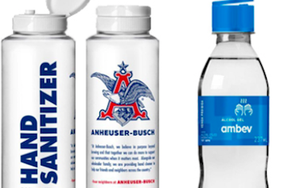
Anheuser-Busch InBev is using
the alcohol leftovers from its production of non-alcohol beers to make sanitizing products it will distribute around the world free of charge.
The world’s largest beer company made the
announcement over the weekend. It said it would produce “over one million bottles” of its hand sanitizer or disinfectant.
It didn’t specify just how big the bottles will
be, but in one instance it did give a more specific detail: In Europe, its breweries will produce 50,000 liters of ready-to-use disinfectant alcohol made from the surplus alcohol in its Jupiler
0.0 and Beck’s Blue alcohol-free brands sold there.
All of the sanitizer is being donated. “We are proud of the resilience, commitment and agility of our teams that made these
initiatives happen and honored to be part of the solution,” he company said in a statement.
advertisement
advertisement
A-B InBev said it will produce sanitizer and disinfectant alcohol liquid “not for
purchase or resale, to hospitals and frontline workers in some of the most impacted areas.”
In North America, the brewer said Anheuser-Busch and Labatt breweries in the U.S. and Canada
have already begun producing and distributing hand sanitizer. In South America, 500,000 bottles of hand sanitizer gel were produced from Brahma 0.0 leftover alcohol and are being distributed to
hospitals in areas that need it most, including Sao Paulo, Rio de Janeiro and Brasilia in hard-hit Brazil.
In recent days, liquor distillers big and small have also committed to making liquid
sanitizing products to combat the virus.
Treatment has strained health resources worldwide for all kinds of necessary products.
Though the beer giant’s announcement didn’t
even come close to mentioning it, Anheuser-Busch InBev is making a big push marketing alcohol-free and low-alcohol beer. It’s probably true it’s never had so much “leftover”
alcohol to give.
Worldwide, no- and low-alcohol beers make up about 8% of the company’s beer volume, as of 2019. It has a goal of upping that volume to 20% by 2025.
It launched
12 since 2018 and now has 80 beers that fit the bill, including four new ones in the U.S.